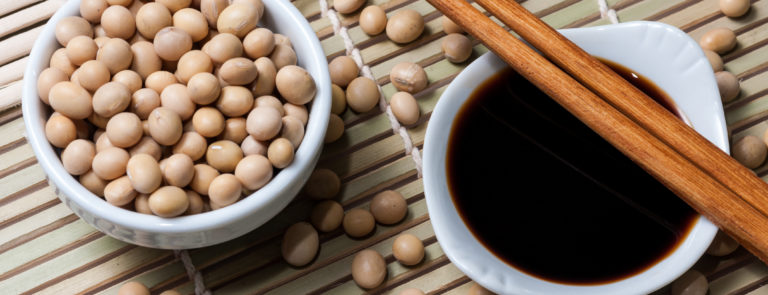15% off €30 OR 20% off €40
Code:OFFER
Is soy sauce bad for you?

Soy sauce is one of the most popular condiments for cooking and dipping however is it actually bad for you? Find out here and it's tasty alternatives
Soy sauce has been used in Chinese cooking for roughly 1,000 years and is now popular in diverse cuisines for its deep, umami-rich flavour.1
Although soy is often associated with veganism and healthy lifestyles, this fermented bean product has developed a bit of a bad reputation. A slew of controversial studies link soy products to serious health issues such as female fertility impairment.2
However – please don’t pour your soy sauce down the sink just yet. Just as soy sauce contains many flavours in one tablespoon, there are many ways soy sauce could be bad or good for you; it’s all about how you use it.
In this article, we’ll explain the rumoured health benefits of soy and how soy sauce might be bad for you – plus, ideal portion sizes, and tasty alternatives.
The health benefits of soy
For every study that says soy sauce is bad for you, another praises soy sauce’s health benefits. Benefits include:- Supporting healthy digestion. A study of shoyu – Japanese soy sauce – showed that consumption may help the gastric tract process food better.3
- Anti-allergenic. Soy sauce might reduce allergic reactions, including inflammation and anaphylactic shock.4
- Antioxidant-rich. Scientists widely agree that soy sauce is rich in antioxidants5, and that’s been linked to a whole host of health benefits.
- Reduction in overall sodium intake. Replacing salt with soy sauce helps to reduce the total sodium content of traditional European recipes6 and so reduces the health risks associated with high salt consumption.
How soy sauce might be bad for you
Some studies show health risks associated with soy sauce, due to its:- High sodium content. 1 tablespoon of soy sauce contains 900mg of sodium – around one-third of your daily salt allowance.7
- Negative impact on hyperthyroidic individuals. Although there’s no proof soy sauce impacts thyroid function in healthy individuals, it might impact the effect of medication those with hyperthyroidism.8
- Anti-nutrient content. Like many grains and legumes, soybeans contain anti-nutrients which affect how the body absorbs protein and vitamins. However, the fermentation process reduces the content of anti-nutrients in soy sauce.9



